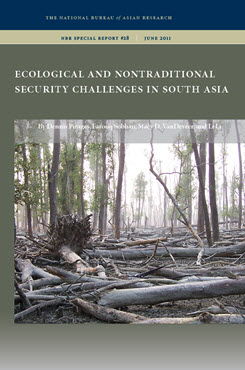Nontraditional Security Challenges in South Asia
This essay provides an overview of the key nontraditional security (NTS) issues facing South Asia and examines ongoing and potential initiatives to mitigate future NTS challenges.
EXECUTIVE SUMMARY
This essay provides an overview of the key nontraditional security (NTS) issues facing South Asia and examines ongoing and potential initiatives to mitigate future NTS challenges.
MAIN FINDINGS
- Excessive military spending in South Asia has been one of the reasons for restricting expenditure on human security and NTS issues. During 1998–2008, defense budgets increased by 41%.
- In South Asia, food costs constitute the average household’s largest expenditure. If food prices continue to rise without a matching increase in incomes of people at the bottom of the economic ladder, it is estimated that approximately 100 million people could be pushed back into poverty.
- Over the past 25 years, natural disasters and environmental degradation have killed nearly half a million people in South Asia and inflicted colossal damages estimated at $59 billion.
- The lack of long-term energy planning by South Asian countries has caused human suffering and significantly hindered the entire region’s economic growth prospects.
- While there is growing recognition that both traditional and nontraditional security challenges require regional integration and regional solutions, a number of studies in South Asia have found that the main obstacles to such cooperation in countering NTS threats remain mistrust and the absence of political will.
POLICY IMPLICATIONS
- South Asian governments have not yet fully realized that military measures and domestic policies alone cannot overcome NTS challenges; rather, many of these challenges must be faced collectively and through regional cooperation.
- A framework for managing regional disasters needs to be designed. The framework should include a comprehensive strategy and action plan, cover institutional mechanisms, provide tools for mitigation measures, and facilitate a legal framework and policy directions.
- Special attention should be paid to strengthening networking among research institutions in the region working on NTS issues and encouraging them to provide inputs, ideas, and strategies for joint action. It is equally important that this network of research institutions closely monitors and evaluates regional and subregional projects.


